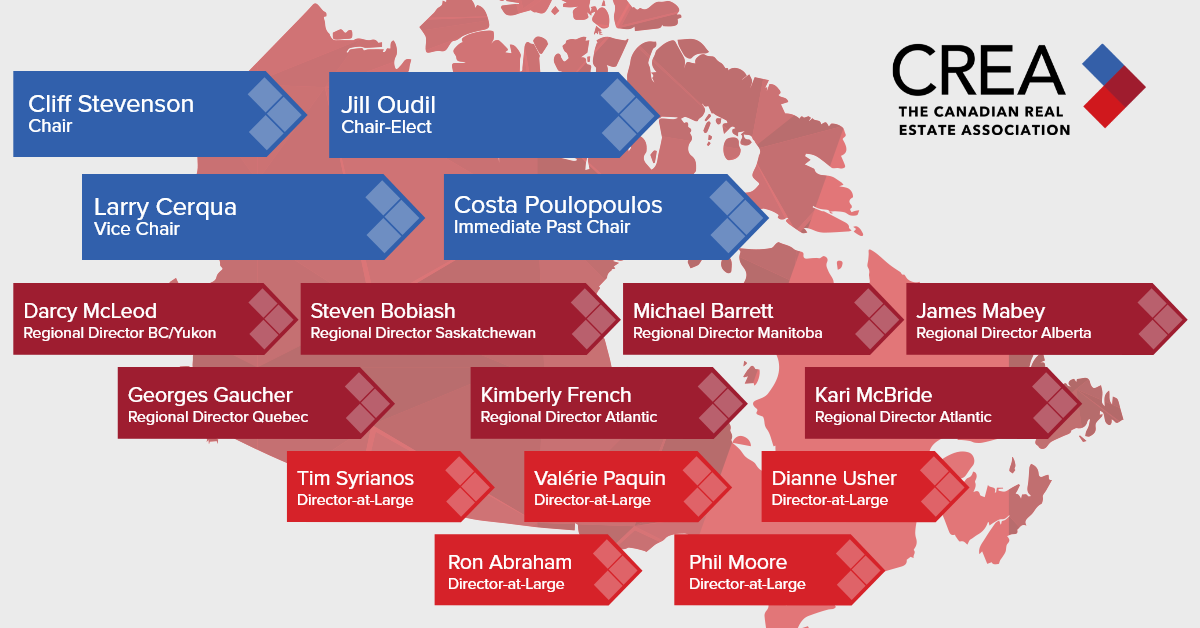On April 13, CREA held its Annual General Meeting for the second time in a virtual setting – one that we’re all too familiar with. Outgoing Chair Costa Poulopoulos and CEO Michael Bourque offered a great overview of accomplishments in government relations; changes to the fundamental way CREA operates as a result of the pandemic; as well as ambitious plans set in motion last year to increase collaboration between CREA, boards and associations, and all REALTOR® members.
From coast-to-coast-coast, Canadians have been impacted by the COVID-19 pandemic. In 2020, CREA made it a priority to support members as they faced these unprecedented challenges head-on. That said, we’re thrilled to hear the tools, services and communications efforts introduced in 2020 were received with open arms by many members. This included lobbying the federal government to make sure REALTORS® qualified for assistance during the pandemic, offering members the ability to promote live stream open houses and virtual tours on their REALTOR.ca listings, as well as the launch of REAL TIME magazine and podcast.
This year we once again voted virtually; welcomed our new Board of Directors, with many familiar names and faces; and formally introduced our new Chair, Cliff Stevenson. We will chat more with Cliff to find out about his plans and goals for his time as Chair in next month’s edition of News2Me.
CREA is also excited to welcome Stefan Swanepoel as Board Advisor in 2021.
Meet our Board of Directors:

Voting delegates representing members across the country voted on the following:
REALTOR® Code
A technical change in wording was proposed to Rule 9.3 to include provincial associations that have direct members, and allow them to choose either to take on the enforcement of the REALTOR® Code independently, or delegate it to an outside body, so long as that organizations agrees. Prior to the edit, only boards with direct members had this choice, but after requests from many provincial associations it was clear this was the best course of action. This motion was approved.
Voting Structure
Based on the recommendations of CREA’s Voting Structure Task Force, two proposed changes to CREA’s voting structure were put forward to help ensure it remains fair and sustainable:
Capping:
Capping the number of votes that a board or association may hold for all matters at CREA assemblies at 38% of the total number votes available to be cast at the assembly. This motion was approved.
Qualified Majority:
Implementing a qualified majority system, which requires 6% of all boards and associations to vote in favour of a motion, in order for a motion to pass. This motion was approved.
Dues Increase
A dues increase was the last of the motions to be put forward. Darcy McLeod, Chair of CREA’s Finance Committee took to the metaphorical floor to explain the benefits and reasoning behind the proposal, this included:
- a slow leveling-off of new memberships in 2019 and prior;
- the continued importance to invest in technology that benefits REALTORS®;
- CREA’s advocacy efforts on behalf of REALTORS®;
- the continued outreach to the public promoting the value of using a REALTOR® in these increasingly competitive times; and
- dues have not changed over the past 10 years.
This motion was defeated.
Despite the unwelcome result of the vote, CREA and its relevant committees will continue to provide exceptional member value and work hard to support our members, boards, and associations, while maintaining open communication channels.
If you have questions or would like to contact us about any of the above, please reach out to our Member Experience Centre team at support@crea.ca.




